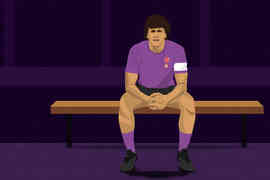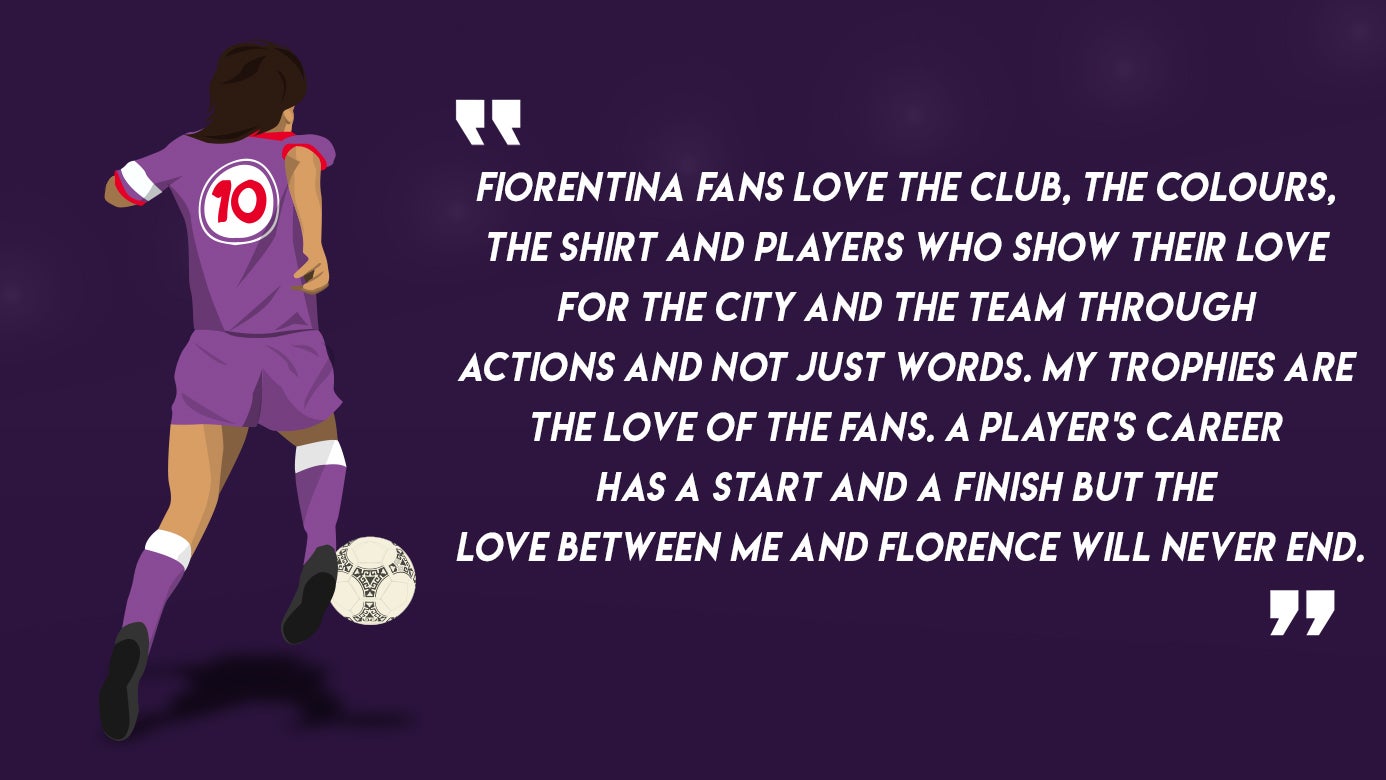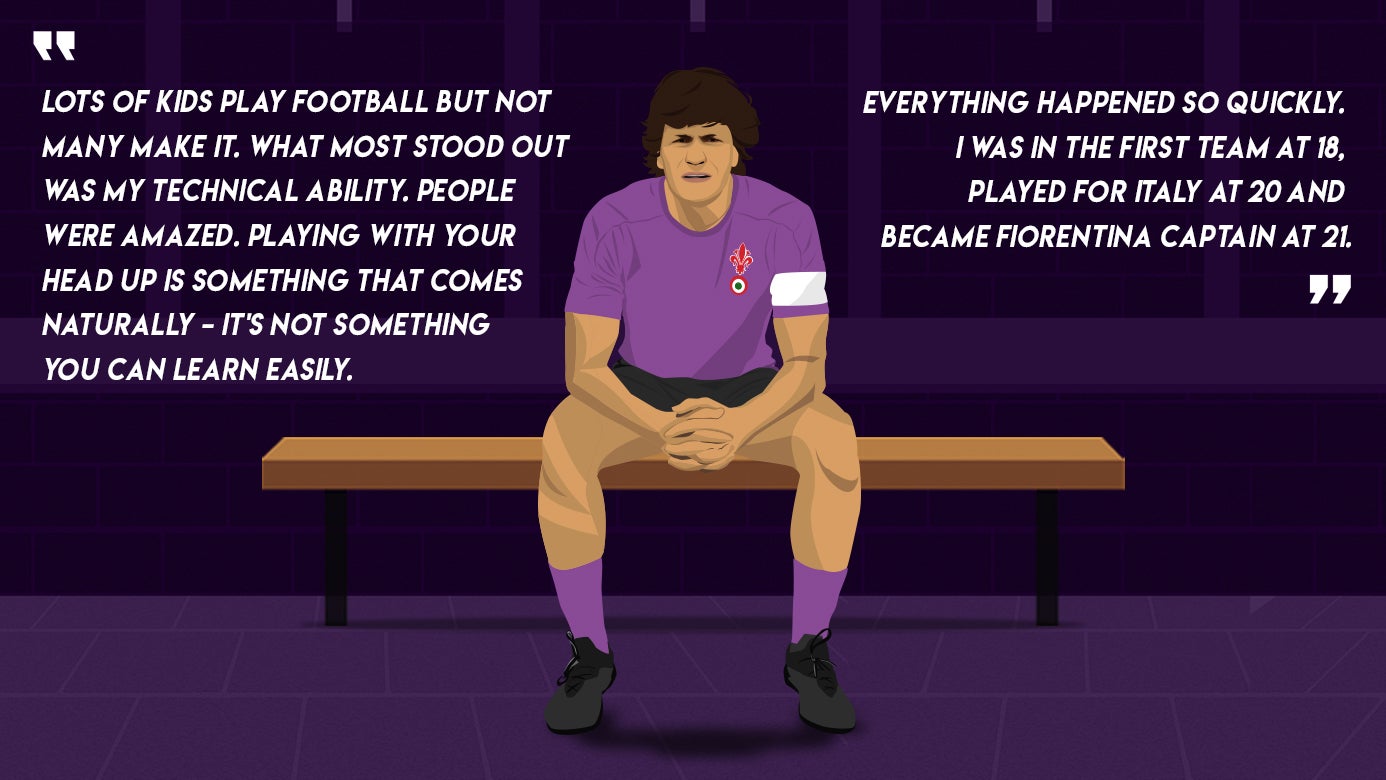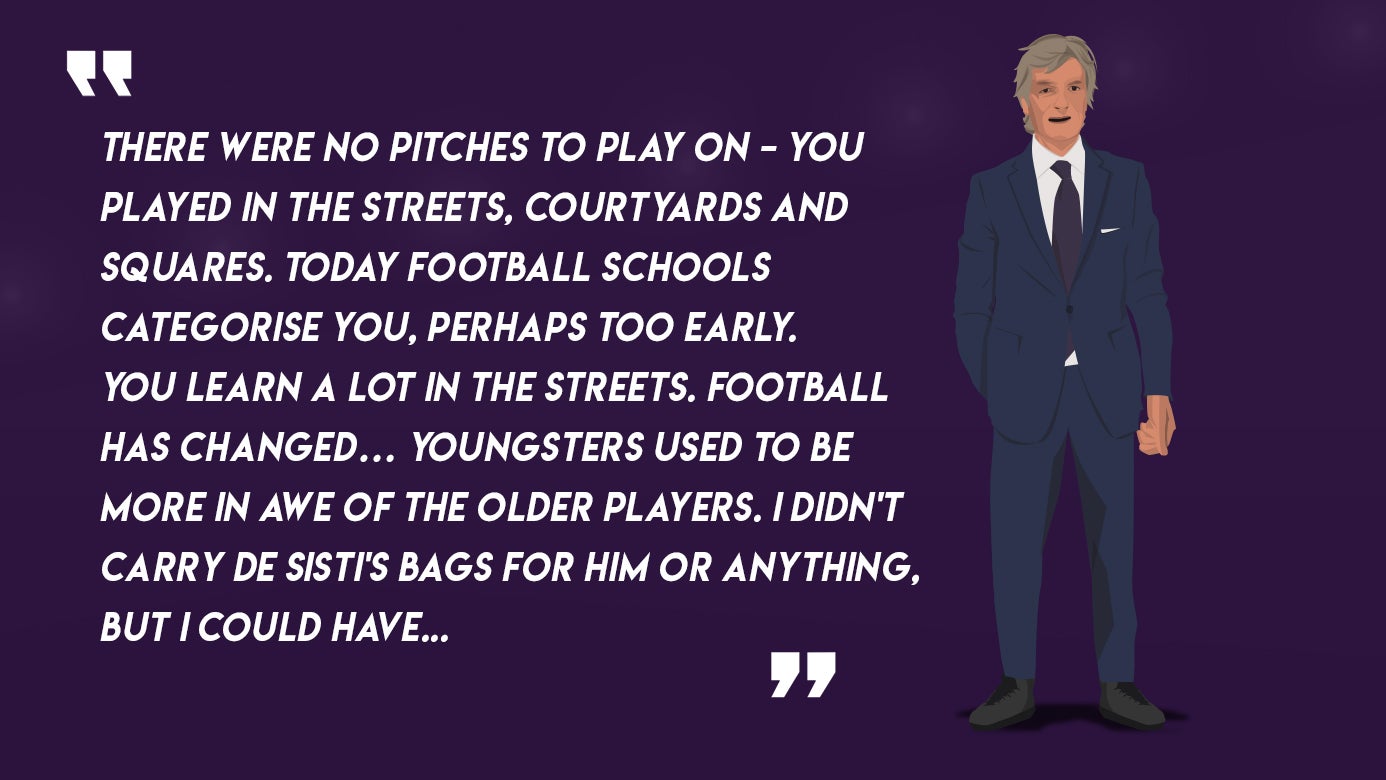
ONE ON ONE: GIANCARLO ANTOGNONI
On his Birthday, Giancarlo Antognoni reflects on his story with Fiorentina.
Club legend Giancarlo Antognoni turns 67 today. A Fiorentina star, icon, captain, No.10, he shares a bond with Florence and the fans that keeps getting stronger, despite the passing years. The memories are still vivid. Giancarlo sat down with us to reflect on his career, his life and his story with Florence and Fiorentina.
BECOMING A FOOTBALLER
"I was born in the country, where there was nothing and nobody. I spent the first eight years of my life playing around in the barnyard. We were farmers. Then my grandfather sold our house in the country and bought three flats in Perugia, one for each of his three sons. I moved to Perugia and that's when I started playing football.
"I was absolutely crazy about football and from the age of 10 to 12 I joined a Prima Categoria team. I started out as all boys do – or did at the time, things are different now – and began playing matches for the team. When I was 15 I was spotted by a scout and went for a trial with Torino. They signed me and another kid from Perugia, so I moved to Turin, but didn't stay long. That's when I started to think I might be able to make it the game, though not necessarily professionally. Torino sent me to Asti, one of their feeder clubs, who played in Serie D at the time.
"I developed very rapidly for my age. It's hard to remember the various stages because it all went so quickly.
"Lots of kids play football but not many make it.
"I spent three years at Asti, did well there and Fiorentina took notice of me."

BECOMING ANTOGNONI
"I began to show what I could do between the ages of 15 and 18. I was playing in Serie D aged 16, 17 and started attracting attention. I'd come to Florence every so often, to Coverciano, when I was called up to the Italy youth teams. I stood out and Fiorentina started tracking me.
"Everyone was waxing lyrical about me then – my brother will tell you that. I caught the eye. It was very unusual to get called up to the Italy Juniores team at the age of 16 while playing in Serie D. They were virtually all Serie A players.
"What most stood out was my technical ability. People were amazed. I was a slight figure but I had a powerful foot even as a kid. People noticed my long passes and the goals I scored from outside the box. Playing with your head up is something that comes naturally – it's not something you can learn easily. You need vision.
"I joined Fiorentina when I was 18 and went into the Primavera team. There was a pecking order and I had a lot of respect for the captain, [Giancarlo] De Sisti. I even roomed with him. I was young and felt a bit uneasy. De Sisti was suspended for the third Serie A match that season and [Nils] Liedholm played me. Then De Sisti left and I took his place, the captain's armband and his shirt number.
"Everything happened so quickly. I was in the first team at 18, played for Italy at 20 and became Fiorentina captain at 21."
FIORENTINA AND THE FANS
"When I joined Fiorentina I spent a lot of time with [Moreno] Roggi, [Vincenzo] Guerini and the other players who were more or less the same age as me. I shared a flat with Moreno Roggi when I came to Florence. We were in the Villa in Via Carnesecchi first, then we moved into a flat together. There were four or five talented youngsters: Guerini, Roggi, [Claudio] Desolati, [Domenico] Caso… Then we were joined by the foreigners, [Daniel] Bertoni and [Daniel] Passarella.
"I enjoyed playing with all of them – youngsters like Caso and [Gianfranco] Casarsa initially and later Bertoni. We had one sort of team in the '70s, then after 1980 it was different and we almost won the title. We had an excellent side with the likes of [Francesco] Graziani, [Eraldo] Pecci, Bertoni and Passarella.
"I always had a great relationship with the fans and they always carried me along in Florence. I never wanted to leave, despite receiving offers from big clubs. I felt a special bond with Florence. Juventus wanted me in 1978, but the president and I agreed that I would stay. In 1980 Roma wanted me and I had dinner with president [Dino] Viola but I said no to him too.
"I could go on forever about the bond I have with Florence. It was strong right from the very start. They never criticised me when I came off. I stayed because I always felt at home. Even when I didn't play well – which wasn't very often, admittedly – the fans still loved me. They forgave the odd below-par performance. I was always 'Antognoni'. My commitment was never lacking, that's for sure, even though we did have a few bad seasons, like in 1977 when we almost got relegated.
"The best feelings were on my debut, my first goal, and all the firsts in general. There were good times and bad times. A few trophies, though not many sadly. I remember the Coppa Italia final against AC Milan in 1975. And my farewell match with the fans' display of love – that was touching, but hard.
"The fans' feelings for me have been handed down through the generations, from father to son. Fiorentina fans love the club, the colours, the shirt and players who show their love for the city and the team through actions and not just words. The choices you make have a value.
"It was love at first sight with the fans. 1000-1500 people came to watch training every day. That's when my relationship with Florentines began.
"My trophies are the love of the fans.
"A player's career has a start and a finish but the love between me and Florence will never end."

ITALY
"My relationship with Italy wasn't quite so idyllic. I spent 10 years playing for Italy and won the World Cup, but I could have done better. It's different when you play for the national team, though. I was nearly always on my own, except for the World Cup in Spain, when there were three or four Fiorentina players. I always got on really well with everyone but there were a few difficult situations. When we played the Euros on home soil in 1980, I had a good tournament but we lost the third-place play-off. I had a great game against England in Turin but then I got injured.
"1982 was the pinnacle for that Italy team. We might have reached the final in 1978 too. The '82 World Cup was tough at the start, with the first group stage and the media blackout. Then we moved to Barcelona and the win over Argentina was a massive confidence boost. We were really fired up after beating Bertoni, Passarella, Maradona... Then we needed to beat Brazil, and we did. After that it didn't matter who the opponents were – we could have beaten anyone. Only France might have been a serious threat. Paolo Rossi scored in every game after that. He got off to a bad start but he was lethal in the box. I'm still very sad about his death.
"I jeopardised my own chances of playing in the final. I was desperate to score in the semi-final and got myself injured. The final was three days later and I didn't manage to recover in time. I would have been a penalty taker too. Before the final I was in the hotel lobby and L'Avvocato [Gianni] Agnelli came up to me and said: 'I've always wanted to sign you but you never wanted to join us.' I was sad about not playing in the final but that was nice to hear. It was all because of my disallowed goal against Brazil – mentally, that changed me and my destiny at that World Cup. Sure, we won it, but I'm not in the photo of the starting XI for example, even though I played six of the seven games.
"You only get one chance, if that, to play in a final. I was really sad about it."
HOW FOOTBALL HAS CHANGED
"“I started out like any other kid, with all the differences compared to nowadays. There were no football schools and we didn't have any of the benefits you have today. I started off playing in the city, which was what everyone did at the time. There were no pitches to play on – you played in the streets, courtyards and squares. The balls were much heavier too, not like today's.
"Kids don't play in the streets anymore but they have the facilities, pitches and good coaches to help them. Football schools categorise you, perhaps too early. You learn a lot in the streets. If you're used to playing on cobblestones or concrete, when you move onto a pitch, everything is so much easier. Perhaps that was an advantage in a way, back then. There used to be lots of Italian players with superb technique.
"Football has changed. It changes every decade or so. It's still football but certain things change: tactics, technique, physicality. Nowadays football is more tactical than technical because that's what coaches drum into you.
"Football has been changed by computers too. Relationships are completely different. Youngsters nowadays are often more interested in their phones than in interpersonal relationships. I don't know what I'd have done with a phone in my day! I'm glad we didn't have them back then. I had a good life. I have a good life now too. But it defines the era. Everything would have been different – relations between players and fans too. There's more focus on players nowadays, although I think players are more focused on themselves as well – more professional, perhaps. Ever since Bosman, players have had more power.

"Dietary guidelines and training methods have changed too. I used to eat meat before the game, which is crazy. Or risotto. Nowadays you have pasta, sugars, bresaola. We never used the gym but it's a priority now. Players are tougher physically – bigger and better built. They still used to kick lumps out of you on the pitch but we were more slender. Nowadays goalkeepers are all at least 1 metre 90.
"You used to be able to drink and smoke. Players look after themselves better now; they're more aware. They look to the future. They earn more than we did in my day and since they earn a lot, they're understandably more careful about their bodies and their health. People live longer and careers are longer: 35 used to be the limit.
"We used to talk more in the dressing room, whereas modern communication is more through phones. Of course everyone helps each other on the pitch. But youngsters used to be more in awe of the older players. I didn't carry De Sisti's bags for him or anything, but I could have...
"The game is played at a faster tempo as well so it's harder to use vision. If you hold onto the ball for too long, you'll find yourself looking up... at the sky! Speed is crucial nowadays. You work on speed, strength and technique. You have to be able to combine speed with technique.
"The old-school No.10 doesn't exist anymore because of the way the game is played. Once upon a time you built your team around the No.10. Now you build a team through the spine, from the keeper to the centre forward through the centre-back and defensive midfielder. The goalkeeper is so important now – like a striker. Trequartistas play more as second strikers, like [Roberto] Baggio, [Francesco] Totti or [Alessandro] Del Piero. [Gaetano] Castrovilli is more of an attacking midfielder, although he's the most similar to a traditional No.10. Yet he has to track back and defend.
"Nowadays teams know exactly what they have to do in a given situation; there used to be much more freedom. Football is more methodical now. You study the opposition, watch videos, learn about your team-mates, your mistakes. In the past a player could win games single-handedly; now it's virtually impossible to win unless you play as a team. There are individuals who make a big difference and help, but it nearly all comes down to team play.
"Yes, football has changed quite a bit..."
LIFE AFTER PLAYING
"When you hang up your boots, some people stay in the game and some move on to other things. If you stay within a club it's easier to understand certain situations and difficulties, especially when results aren't going your way. I'm with the team every day so I have less difficulty understanding the problems. Unexpected things come up all the time but it's easier to understand the dynamics and judge situations from the inside.
“Sometimes I'm surprised when former players are harsh with their criticism. Perhaps they do it with good intentions but without a full understanding of the situation. They used to be players themselves, some of them even club officials. They should understand the internal difficulties that can arise because they've experienced certain situations on and off the pitch as players. Sometimes they go overboard with their remarks. I can understand fans complaining about certain things, but not those who have played the game at the top level. It's easy to condemn if you don't know how things work. With social media there's misinformation too because a made-up story can spread quickly, making things even more complicated.
"If you don't know the internal dynamics, you're better off not making hasty judgements."
Interview by Vieri Capretta







